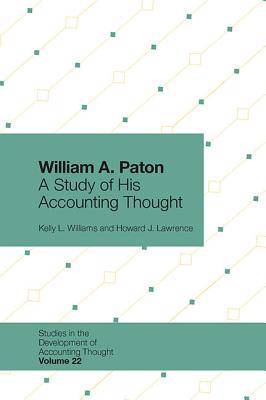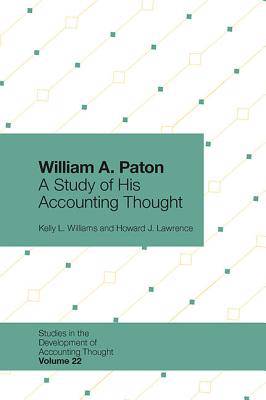
- Afhalen na 1 uur in een winkel met voorraad
- Gratis thuislevering in België vanaf € 30
- Ruim aanbod met 7 miljoen producten
- Afhalen na 1 uur in een winkel met voorraad
- Gratis thuislevering in België vanaf € 30
- Ruim aanbod met 7 miljoen producten
Zoeken
€ 217,45
+ 434 punten
Omschrijving
For more than 70 years, William Paton contributed his considerable energy and knowledge to the development of accounting thought. He was one of the early accounting educators to express the high purpose of accounting and its importance in the university, and he was among the early theorists in accounting to argue that accounting needed a coherent, theoretical structure that would guide the accountant in preparing financial statements. Yet a full account of his life, career, and ideas has not yet appeared.
Kelly L. Williams and Howard J. Lawrence address this gap, painting an intimate and comprehensive portrait of this deeply influential figure. Their groundbreaking study not only explores major influences on Paton's thoughts on accounting, but also shows how Paton was an active participant in the professional accounting organizations of his day, how early on he urged the societies to conduct research to develop a consistent and rational body of knowledge, and how, with other early scholars, he was instrumental in developing the first issues of The Accounting Review--a beginning that helped make the Review the outstanding publication it is today. Ultimately, the authors demonstrate why Paton received practically every major honor an accounting educator could receive, including recognition in 1987 by the AICPA as the "Educator of the Century."
As the only comprehensive study of Paton's life and thought, this is a must-have for graduate students of accountancy and researchers of accounting history and theory, and it is of keen interest to anyone who wishes to develop their own research methodology and pedagogy through a study of one of the greatest thinkers and educators in the history of accountancy.
Kelly L. Williams and Howard J. Lawrence address this gap, painting an intimate and comprehensive portrait of this deeply influential figure. Their groundbreaking study not only explores major influences on Paton's thoughts on accounting, but also shows how Paton was an active participant in the professional accounting organizations of his day, how early on he urged the societies to conduct research to develop a consistent and rational body of knowledge, and how, with other early scholars, he was instrumental in developing the first issues of The Accounting Review--a beginning that helped make the Review the outstanding publication it is today. Ultimately, the authors demonstrate why Paton received practically every major honor an accounting educator could receive, including recognition in 1987 by the AICPA as the "Educator of the Century."
As the only comprehensive study of Paton's life and thought, this is a must-have for graduate students of accountancy and researchers of accounting history and theory, and it is of keen interest to anyone who wishes to develop their own research methodology and pedagogy through a study of one of the greatest thinkers and educators in the history of accountancy.
Specificaties
Betrokkenen
- Auteur(s):
- Uitgeverij:
Inhoud
- Aantal bladzijden:
- 192
- Taal:
- Engels
- Reeks:
- Reeksnummer:
- nr. 22
Eigenschappen
- Productcode (EAN):
- 9781787564084
- Verschijningsdatum:
- 4/10/2018
- Uitvoering:
- Hardcover
- Formaat:
- Genaaid
- Afmetingen:
- 157 mm x 231 mm
- Gewicht:
- 408 g

Alleen bij Standaard Boekhandel
+ 434 punten op je klantenkaart van Standaard Boekhandel
Beoordelingen
We publiceren alleen reviews die voldoen aan de voorwaarden voor reviews. Bekijk onze voorwaarden voor reviews.








